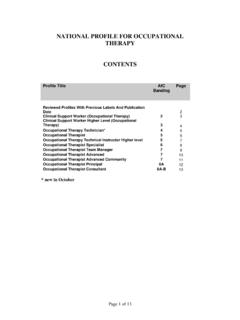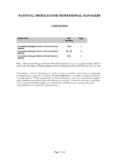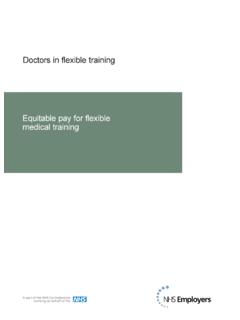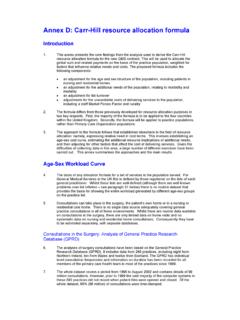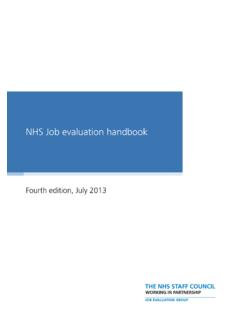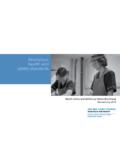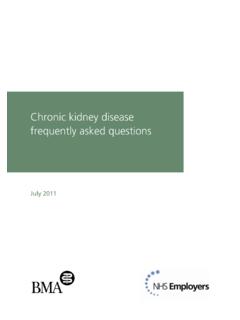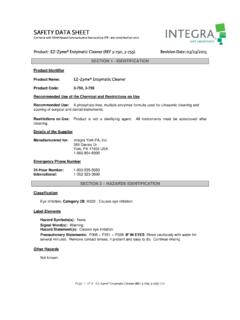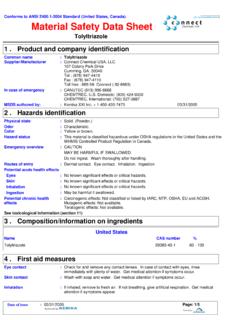Transcription of A Code of Conduct for Private Practice - NHS …
1 A code of Conduct forPrivate PracticeRecommended Standards of Practice for NHS ConsultantsJanuary 2004A code of Conduct for Private PracticeRecommended Standards of Practice for NHS ConsultantsJanuary 2004 PART I -Introduction1 Scope of Code1 Key Principles1 PART II - Standards of Best Practice2 Disclosure of Information about Private Practice2 Scheduling of Work and On-Call Duties2 Provision of Private Services alongside NHS Duties3 Information for NHS Patients about Private Treatment3 Referral of Private Patients to NHS Lists4 Promoting Improved Patient Access to NHS Careand increasing NHS Capacity5 PART III - Managing Private Patients in NHS Facilities6 Use of NHS Facilities6 Use of NHS Staff7 ContentsiiiA code of Conduct for Private Practice Recommended Standards of Practice for NHS ConsultantsScope of document sets out recommended standards of best Practice forNHS consultants in England about their Conduct in relation to privatepractice1.
2 The standards are designed to apply equally to honorarycontract holders in respect of their work for the NHS. The code coversall Private work, whether undertaken in non-NHS or NHS facilities. to the standards in the code will form part of the eligibilitycriteria for Clinical Excellence code should be used at the annual Job Plan review as the basis forreviewing the relationship between NHS duties and any Private Practice . Key code is based on the following key principles: NHS consultants and NHS employing organisations should workon a partnership basis to prevent any conflict of interest betweenprivate Practice and NHS work. It is also important that NHSconsultants and NHS organisations minimise the risk of anyperceived conflicts of interest; although no consultant should sufferany penalty (under the code ) simply because of a perception; the provision of services for Private patients should not prejudicethe interest of NHS patients or disrupt NHS services; with the exception of the need to provide emergency care, agreedNHS commitments should take precedence over Private work.
3 And NHS facilities, staff and services may only be used for privatepractice with the prior agreement of the NHS IIntroduction1A code of Conduct for Private Practice Recommended Standards of Practice for NHS Consultants1 The expression Private Practice in this code of Conduct includes:athe diagnosis or treatment of patients by Private arrangement (including such diagnosis or treatmentunder section 65(2) of the National Health Service Act 1977), excluding fee paying services as describedin Schedule 10 of the Terms and in the general medical, dental or ophthalmic services under Part II of the National Health ServiceAct 1977 (except in respect of patients for whom a hospital medical officer is allowed a limited list , members of the hospital staff ).Disclosure of Information about Private should declare any Private Practice , which may give rise toany actual or perceived conflict of interest, or which is otherwise relevantto the practitioner s proper performance of his/her contractual part of the annual Job Planning process, consultants should disclosedetails of regular Private Practice commitments, including the timing,location and broad type of activity, to facilitate effective planning ofNHS work and out-of-hours the appraisal guidelines agreed in 2001, NHS consultants shouldbe appraised on all aspects of their medical Practice , including privatepractice.
4 In line with the requirements of revalidation, consultantsshould submit evidence of Private Practice to their appraiser. Scheduling of Work and On-Call circumstances where there is or could be a conflict of interest,programmed NHS commitments should take precedence over privatework. Consultants should ensure that, except in emergencies, privatecommitments do not conflict with NHS activities included in theirNHS Job Plan. should ensure in particular that: Private commitments, including on-call duties, are not scheduledduring times at which they are scheduled to be working for theNHS (subject to paragraph below); there are clear arrangements to prevent any significant risk ofprivate commitments disrupting NHS commitments, bycausing NHS activities to begin late or to be cancelled; Private commitments are rearranged where there is regulardisruption of this kind to NHS work; andPart IIStandards of Best Practice2A code of Conduct for Private Practice Recommended Standards of Practice for NHS Consultants Private commitments do not prevent them from being able toattend a NHS emergency while they are on call for the NHS,including any emergency cover that they agree to provide for NHScolleagues.
5 In particular, Private commitments that prevent animmediate response should not be undertaken at these Job Planning should minimise the potential for conflicts ofinterests between different commitments. Regular Private commitmentsshould be noted in a consultant s Job Plan, to ensure that planning is aseffective as will be circumstances in which consultants may reasonably provideemergency treatment for Private patients during time when they arescheduled to be working or are on call for the NHS. Consultants shouldmake alternative arrangements to provide cover where emergency workof this kind regularly impacts on NHS there is a proposed change to the scheduling of NHS work, theemployer should allow a reasonable period for consultants to rearrangeany Private sessions, taking into account any binding commitmentsentered into ( leases). Provision of Private Services alongside NHS some circumstances NHS employers may at their discretion allowsome Private Practice to be undertaken alongside a consultant sscheduled NHS duties, provided that they are satisfied that therewill be no disruption to NHS services.
6 In these circumstances, theconsultants should ensure that any Private services are provided with theexplicit knowledge and agreement of the employer and that there is nodetriment to the quality or timeliness of services for NHS patients. Information for NHS Patients about Private the course of their NHS duties and responsibilities consultantsshould not initiate discussions about providing Private services forNHS patients, nor should they ask other NHS staff to initiate suchdiscussions on their behalf. 3A code of Conduct for Private Practice Recommended Standards of Practice for NHS ConsultantsStandards of Best a NHS patient seeks information about the availability of, orwaiting times for, NHS and/or Private services, consultants should ensurethat any information provided by them, is accurate and up-to-date andconforms with any local where immediate care is justified on clinical grounds, consultantsshould not, in the course of their NHS duties and responsibilities, makearrangements to provide Private services, nor should they ask any otherNHS staff to make such arrangements on their behalf unless the patientis to be treated as a Private patient of the NHS facility concerned.
7 Referral of Private Patients to NHS who choose to be treated privately are entitled to NHS serviceson exactly the same basis of clinical need as any other a patient wishes to change from Private to NHS status,consultants should help ensure that the following principles apply: a patient cannot be both a Private and a NHS patient for thetr eatment of one condition during a single visit to a NHSorganisation; any patient seen privately is entitled to subsequently change hisorher status and seek treatment as a NHS patient; any patient changing their status after having been provided withprivate services should not be treated on a different basis to otherNHS patients as a result of having previously held Private status; patients referred for an NHS service following a privateconsultation or Private treatment should join any NHS waiting listat the same point as if the consultation or treatment wer e an NHSservice. Their priority on the waiting list should be determined bythe same criteria applied to other NHS patients; and should a patient be admitted to an NHS hospital as a privateinpatient, but subsequently decide to change to NHS status beforehaving received treatment, there should be an assessment todetermine the patient s priority for NHS care.
8 4A code of Conduct for Private Practice Recommended Standards of Practice for NHSC onsultantsStandards of Best Practice11 - This bullet point has been removed to reflect changes brought into effect by virtue of the Guidance on NHS patients who wish to pay for additional Private care published by the Department of Health, following consultation, on 23 March Improved Patient Access to NHS Care andincreasing NHS Subject to clinical considerations, consultants should be expected tocontribute as fully as possible to maintaining a high quality service topatients, including reducing waiting times and improving access andchoice for NHS patients. This should include co-operating to makesure that patients are given the opportunity to be treated by other NHScolleagues or by other providers where this will maintain or improvetheir quality of care, such as by reducing their waiting time. Consultants should make all reasonable efforts to support initiativesto increase NHS capacity, including appointment of additionalmedical staff.
9 5A code of Conduct for Private Practice Recommended Standards of Practice for NHS ConsultantsStandards of Best Practice6A code of Conduct for Private Practice Recommended Standards of Practice for NHS may only see patients privately within NHS facilities withthe explicit agreement of the responsible NHS organisation. It is forNHS organisations to decide to what extent, if any, their facilities, staffand equipment may be used for Private patient services and to ensurethat any such services do not interfere with the organisation s obligationsto NHS patients. who practise privately within NHS facilities must complywith the responsible NHS organisation s policies and procedures forprivate Practice . The NHS organisation should consult with allconsultants or their representatives, when adopting or reviewingsuch of NHS consultants may not use NHS facilities for the provision of privateservices without the agreement of their NHS employer. This applieswhether Private services are carried out in their own time, in annual orunpaid leave, or subject to the criteria in paragraph alongsideNHS duties.
10 The employer has agreed that a consultant may use NHS facilitiesfor the provision of Private services: the employer will determine and make such charges for the use ofits services, accommodation or facilities as it considers reasonable; any charge will be collected by the employer, either from thepatient or a relevant third party; and a charge will take full account of any diagnostic procedures used,the cost of any laboratory staff that have been involved and the costof any NHS equipment that might have been used. in emergencies, consultants should not initiate Private patientservices that involve the use of NHS staff or facilities unless anPart IIIM anaging Private Patientsin NHS Facilitiesundertaking to pay for those facilities has been obtained from (or onbehalf of ) the patient, in accordance with the NHS body s line with the standards in Part II, Private patient services should takeplace at times that do not impact on normal services for NHS patients should normally be seen separately from scheduled NHSpatients.
